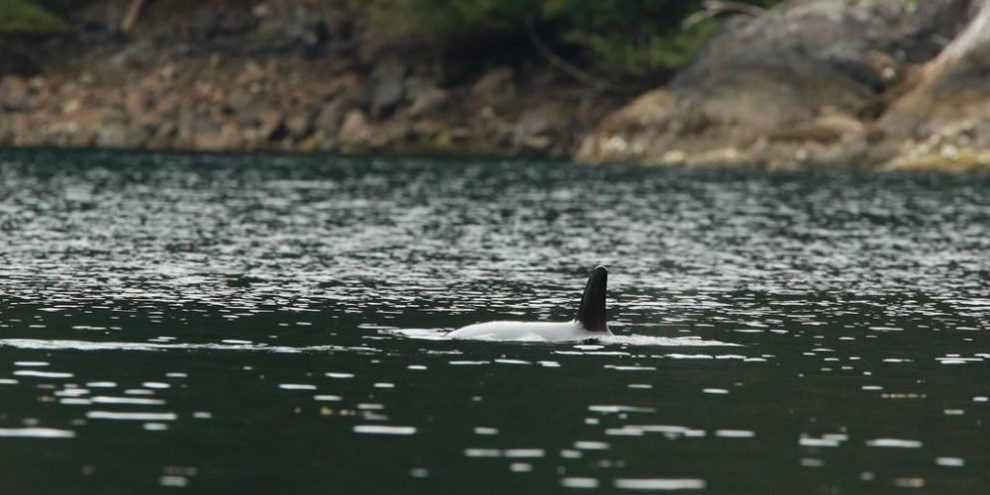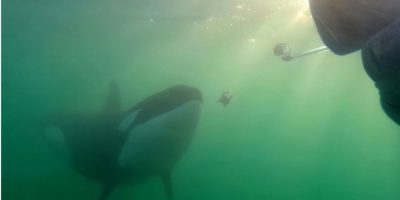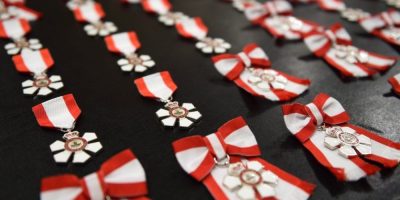
By Dirk Meissner
Thick fog covers the mountainside as heavy, pounding rain pelts a remote lagoon Tuesday near the northern Vancouver Island village of Zeballos, where a real-life drama involving a stranded killer whale calf is unfolding.
The two-year-old orca has been alone in the tidal lagoon near Little Espinosa Inlet since March 23 when its pregnant mother became trapped by the low tide and died on the rocky beach.
Efforts to get the calf to open water where it might reconnect with its pod members have included using a flotilla of boats to convinced it out at high tide, setting a series of directional lines leading out of the lagoon and playing recorded whale calls from its family.
The rescue team that includes Fisheries Department marine mammal experts, area Ehattesaht First Nation leaders and whale scientists have not been able to coax the orca calf to swim through a narrow channel where its mother died.
Cedar boughs placed by the First Nations residents, who have named the orca calf kwiisahi?is, or Little Brave Hunter, hang from a bridge that the young orca must swim under, while a bouquet of flowers rests at the roadside where locals and visitors are keeping vigil.
"It's pretty sad. She's alone," said Vancouver resident Ivisa Simunovic, who scaled a steep slope to get to a beach where she could see the young killer whale.
"And it's a baby, so she's going to have a hard time trying to be in nature," she said. "I don't know if she will be able to survive. She will have to be rescued. It's sad."
Simunovic said she and her friend, Francisca Barros, were travelling on northern Vancouver Island when they heard about the stranded killer whale calf and the death of its mother.
"It's sad, because how is she going to return? Mammals like orcas are to be with their families, all the time together, and now she's going to be alone," she said of the calf.
Barros said the situation with the orca is tragic, but the experience of seeing a killer whale in the wild was something she will not forget.
"It's our first time. It's a dream," she said.
The stranded killer whale calf is showing signs of regular activity, breaching the surface of the water every seven to 10 minutes. It avoids the narrow exit that leads to the open ocean, which is also where its mother died.
The daily low tide at the lagoon shows the difficult channel where the calf must pass, but also reveals a healthy shoreline that is home to starfish, oysters, mussels and clams.
The lagoon is almost three kilometres long and nearly a kilometre at the widest, with its deepest sections near the middle of more than 30 metres, where the calf spends much of its time.
Officials have been monitoring the animal's health and progress over the past days, but have yet to announce their rescue plans for the coming days when tides are expected to be more favourable.
The Fisheries Department said last week that attempting to lift the orca calf out of the lagoon and place it into the open ocean could be part of the rescue plan, but that would be a last-ditch situation.
The orca calf was photographed last week with a bird in its mouth, which has been taken as a sign that it may be feeding itself, but it is not known if it is eating regularly.
Paul Cottrell, a Fisheries Department marine mammal co-ordinator, said earlier it is believed the calf could still have been depending on its mother for milk and food.
He estimated an orca calf at two years old could survive for up to two weeks without food. Its mother died March 23.
The Fisheries Department said it identified two of the calf's family pods after a researcher examined photographs from a whale watching group that spotted the transient killer whales in Barkley Sound, B.C., on Sunday. The sound is about 150 kilometres south of Zeballos on the west coast of Vancouver Island.
The B.C.-based whale research group Bay Cetology is offering access to its online AI-assisted photo database to local photographers and tour operators as part of efforts to track the whale's relatives, giving the calf a chance to connect with its pod.
Executive director Jared Towers said the technology scans photos of killer whales submitted by those on the water and can quickly identify individual animals based on their dorsal fins and other markings.
He said scientists have been able to identify specific animals based on their fins for more than 50 years, and using AI is the next advancement.
Banner image: The orphaned orca calf is photographed in a lagoon near Zeballos, B.C., on Monday April 1, 2024. THE CANADIAN PRESS/Chad Hipolito
This report by The Canadian Press was first published April 2, 2024.





